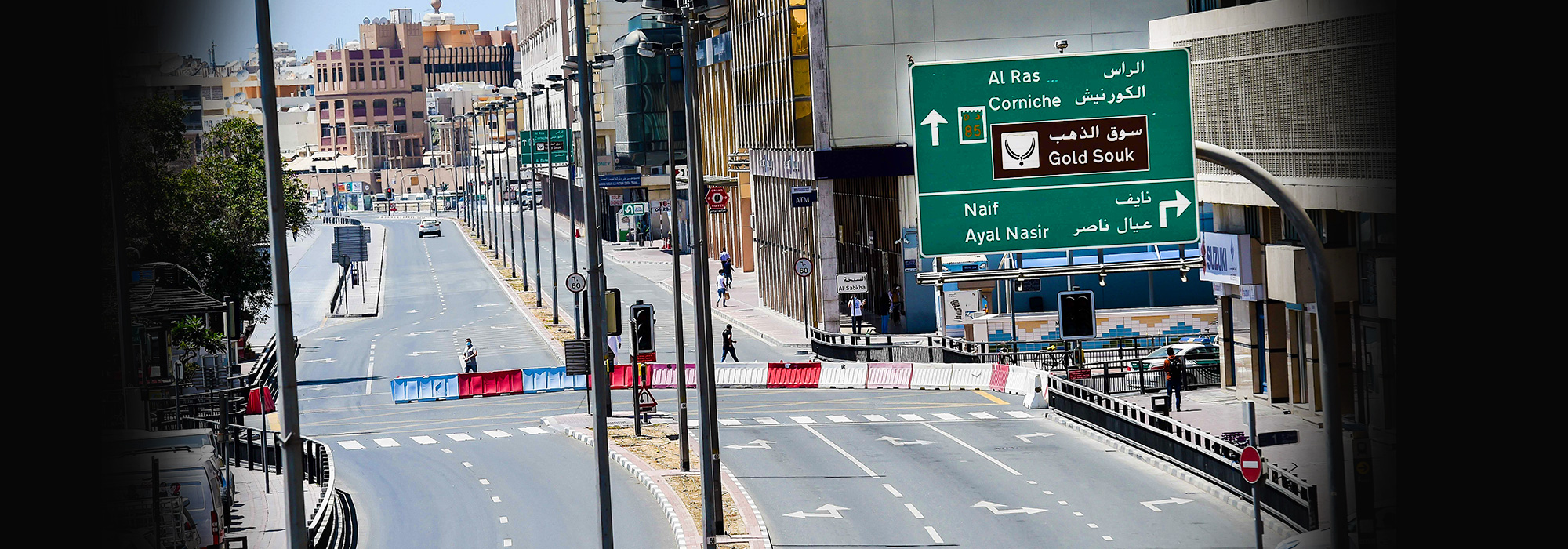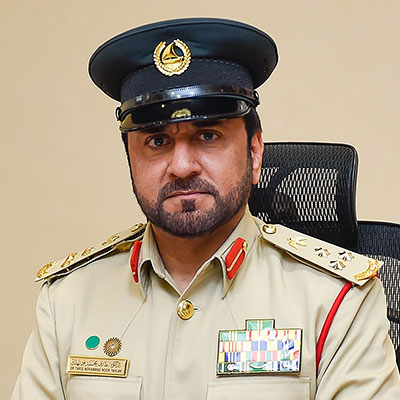

Director of Naif police station, on lifting restrictions in the Naif area
Ali Al Shouk | Senior Reporter
The containment strategy followed by Dubai Government in the Naif district to contain the outbreak of COVID-19 can serve as a perfect example of how important a role Dubai Police played in managing the pandemic.
As the authorities carried out a mass COVID-19 testing and disinfection drive in one of Dubai’s oldest districts, Naif Police Station was the focal point in the implementation of precautionary measures that helped save the lives of thousands of residents and visitors.
The expertise of the police personnel in surveillance and investigation, their familiarity with the area and their close connection with the community in one of the most densely populated areas of Dubai helped control the situation as the area was put under a strict 27-day containment, from March 31 to April 26, to curb the spread of the virus. Today, almost 18 months after the 24-hour movement restrictions were lifted, Brigadier Tarik Tahlak, the Director of Naif Police Station, recalls those moments of relief and celebration when the area was declared COVID-free.
“It was like a carnival, everyone was cheering and people from different nationalities were singing the Emirati national anthem from their apartments and balconies,” Brig. Tahlak told Gulf News. “It was a joyful moment that made one feel happy and that was ample reward for the hard work,” he added.
Dubai Police are not only the first responders to any crisis, but they are also the key players when it comes to assisting the civil administration in arranging resources and maintaining law and order, while performing all their routine responsibilities at police stations.
Going back to those challenging days of COVID-control, Brig. Tahlak recalled that the situation reached an alarming stage when reports about several positive cases of COVID-19 started pouring in from Al Ras area of Dubai.
“There were reports of positive cases coming in from multiple buildings in the area. So, initially, we tried to lock down those buildings to contain the spread of the virus. But the number of infected people kept increasing even after restrictions in those specific buildings,” Brig. Tahlak said. Dubai Police then reported the matter to the Supreme Committee of Crisis and Disaster Management and the decision to impose containment measures in the entire Naif district was taken after sunset on March 31, 2020.
“We implemented the order immediately by forming teams and dividing the tasks. It was hard to apprise the residents about the closure,” added Tahlak. A team of volunteers from different nationalities, with support from the Watani Al Emarat Foundation, joined hands to help us in the task. We dealt with people in a friendly manner to raise awareness about the fact that the restrictions had been placed in the interest of their safety. Many people were afraid and wanted to leave the area, but we restrained them by explaining the situation to them.”
To control the situation, Naif Police Station announced a state of alert for all frontline workers, government entities and other departments of Dubai Police. “Our teams started collecting information about the infected areas and the number of positive cases. We started conducting PCR tests within the Naif area through two field centres,” he added.
Evacuation of visitors
With the sudden order to place restrictions in the Naif area, visitors who had come on visit visas were trapped. Some of them wanted to reach the airport to catch their return flights. “So, we had to put an evacuation plan in place for those who were trapped in Naif and needed to move out. We conducted tests to ensure those visitors who needed to move out were not infected. We also coordinated with the airlines and embassies concerned,” Brig. Tahlak explained.
The infection rate kept increasing even after the first two weeks of restrictions, but from the third week onwards, there were signs of relief as the numbers started falling. “Three days before lifting the restrictions, the infection rate had reached zero,” Brig. Tahlak said.
One of the happiest moments was the arrival in Naif of the first bus of residents who had recovered from COVID-19. That was during the third week of restrictions. “They received a warm welcome from the other residents and there was a celebration organised by Dubai Police and the residents. It was an unforgettable moment.”
What Naif police station did during the restrictions
More than 10 teams were formed in Naif police station to implement the government’s strategy to curb the spread of the pandemic. One team, for instance, was responsible for monitoring all the entry-exit points in the area. This team was responsible for disinfecting all the people and vehicles going in and out of the area. All entries and exits were registered.
“Then there was another team for logistical support to arrange the movement of food and medical supplies into the area. This team also arranged to have the ATMs in the area replenished with cash,” Brig. Tahlak said.
Charity organisations also pitched in, providing meals for the people in the area. Officers from Dubai Police helped distribute more than 20,000 meals per day during the period that restrictions were in force.
Humanitarian situation
During the lockdown, a resident was in dire need to undergo kidney dialysis at a hospital, but he couldn’t move out of the area. He sought help from Dubai Police. “We arranged to conduct PCR tests for him and an ambulance to transfer him to hospital. We alerted the hospital authorities in advance about the patient and told them to be prepared with all precautionary measures, in case he tested positive for COVID-19. Fortunately, he successfully underwent kidney dialysis and safely returned to the area,” Brig. Tahlak added.
Use of drones for awareness
Dubai’s Naif district is known for its narrow streets and congested neighbourhoods, that are at times difficult for police patrols to access. Keeping this scenario in mind, police officers used drones to spread awareness among the public on how to protect themselves and stay safe. “The drones spread awareness about the consequences of flouting COVID-19 protocols. We used all available means of technology and accessories such as thermal glasses to detect the temperatures of people,” Tahlak said.
Brigadier Tarik Tahlak, Director of Naif police station, on lifting restrictions in the Naif area